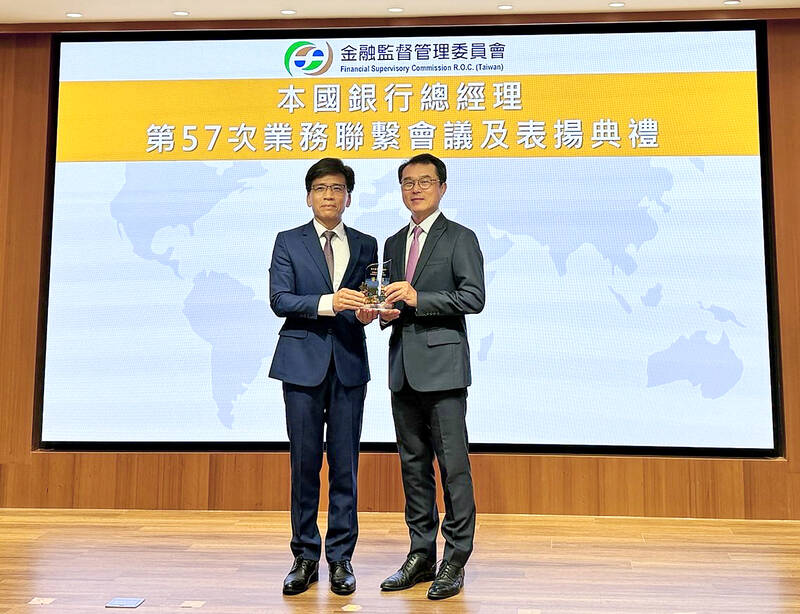Taiwanese banks extended NT$150.3 billion (US$4.63 billion) in new loans to nations included in the government’s New Southbound Policy (NSP) during the first four months of this year, led by lending to India and Australia, data compiled by the Financial Supervisory Commission showed earlier this month.
The figure is 1.8 times the NT$83.9 billion in new loans to the NSP nations recorded for the whole of last year and 2.37 times the commission’s annual new loan target of NT$63.4 billion for this year, indicating a steady recovery in fund demand in those markets, the regulator said.
The policy, introduced in 2016, is designed to enhance trade and exchanges between Taiwan and 18 nations in Southeast Asia, South Asia and Oceania: Australia, Bangladesh, Bhutan, Brunei, Cambodia, India, Indonesia, Laos, Malaysia, Myanmar, Nepal, New Zealand, Pakistan, Philippines, Singapore, Sri Lanka, Thailand and Vietnam.

Photo courtesy of Taipei Fubon Commercial Bank
Local banks have in the past few years not only increased lending to clients expanding operations in those nations, but also launched new branches or representative offices in the countries in hopes of attracting more business opportunities.
In April, the commission approved Far Eastern International Bank’s (遠東銀行) application to set up a branch in Singapore and permitted O-Bank Co (王道銀行) to launch a representative office in Sydney, Australia, after in February allowing Taipei Fubon Commercial Bank (台北富邦銀行) to open a branch in Mumbai, India.
During the first four months of this year, new loans to India totaled NT$80.2 billion, topping all other NSP nations, followed by Australia with NT$32 billion, Singapore with NT$18.2 billion and Vietnam with NT$13.1 billion, commission data showed.
By individual banks, Taipei Fubon was the most active with new loans of NT$18.9 billion in the first four months, ahead of CTBC Bank’s (中國信託銀行) NT$18 billion and Bank SinoPac’s (永豐銀行) NT$10 billion, followed by Taishin International Bank (台新銀行) with NT$9.7 billion and Chang Hwa Commercial Bank (彰化銀行) with NT$9.3 billion, the data showed.
Overall, Taiwanese banks’ outstanding loans to the 18 nations at the end of April totaled NT$1.74 trillion, the data showed.

NEW IDENTITY: Known for its software, India has expanded into hardware, with its semiconductor industry growing from US$38bn in 2023 to US$45bn to US$50bn India on Saturday inaugurated its first semiconductor assembly and test facility, a milestone in the government’s push to reduce dependence on foreign chipmakers and stake a claim in a sector dominated by China. Indian Prime Minister Narendra Modi opened US firm Micron Technology Inc’s semiconductor assembly, test and packaging unit in his home state of Gujarat, hailing the “dawn of a new era” for India’s technology ambitions. “When young Indians look back in the future, they will see this decade as the turning point in our tech future,” Modi told the event, which was broadcast on his YouTube channel. The plant would convert

‘SEISMIC SHIFT’: The researcher forecast there would be about 1.1 billion mobile shipments this year, down from 1.26 billion the prior year and erasing years of gains The global smartphone market is expected to contract 12.9 percent this year due to the unprecedented memorychip shortage, marking “a crisis like no other,” researcher International Data Corp (IDC) said. The new forecast, a dramatic revision down from earlier estimates, gives the latest accounting of the ongoing memory crunch that is affecting every corner of the electronics industry. The demand for advanced memory to power artificial intelligence (AI) tasks has drained global supply until well into next year and jeopardizes the business model of many smartphone makers. IDC forecast about 1.1 billion mobile shipments this year, down from 1.26 billion the prior

People stand in a Pokemon store in Tokyo on Thursday. One of the world highest-grossing franchises is celebrated its 30th anniversary yesterday.

Zimbabwe’s ban on raw lithium exports is forcing Chinese miners to rethink their strategy, speeding up plans to process the metal locally instead of shipping it to China’s vast rechargeable battery industry. The country is Africa’s largest lithium producer and has one of the world’s largest reserves, according to the US Geological Survey (USGS). Zimbabwe already banned the export of lithium ore in 2022 and last year announced it would halt exports of lithium concentrates from January next year. However, on Wednesday it imposed the ban with immediate effect, leaving unclear what the lithium mining sector would do in the